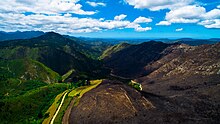| |
|
|
Ecology
|
|
Ecology (from Ancient Greek οἶκος (oîkos) 'house', and -λογία (-logía) 'study of') is the natural science of the relationships among living organisms, including humans, and their physical environment. Ecology considers organisms at the individual, population, community, ecosystem, and biosphere levels. Ecology overlaps with the closely related sciences of biogeography, evolutionary biology, genetics, ethology, and natural history. Ecology is a branch of biology, and is the study of abundance, biomass, and distribution of organisms in the context of the environment. It encompasses life processes, interactions, and adaptations; movement of materials and energy through living communities; successional development of ecosystems; cooperation, competition, and predation within and between species; and patterns of biodiversity and its effect on ecosystem processes. Ecology has practical applications in conservation biology, wetland management, natural resource management (agroecology, agriculture, forestry, agroforestry, fisheries, mining, tourism), urban planning (urban ecology), community health, economics, basic and applied science, and human social interaction (human ecology). The word ecology (German: Ökologie) was coined in 1866 by the German scientist Ernst Haeckel. The science of ecology as we know it today began with a group of American botanists in the 1890s. Evolutionary concepts relating to adaptation and natural selection are cornerstones of modern ecological theory. Ecosystems are dynamically interacting systems of organisms, the communities they make up, and the non-living (abiotic) components of their environment. Ecosystem processes, such as primary production, nutrient cycling, and niche construction, regulate the flux of energy and matter through an environment. Ecosystems have biophysical feedback mechanisms that moderate processes acting on living (biotic) and abiotic components of the planet. Ecosystems sustain life-supporting functions and provide ecosystem services like biomass production (food, fuel, fiber, and medicine), the regulation of climate, global biogeochemical cycles, water filtration, soil formation, erosion control, flood protection, and many other natural features of scientific, historical, economic, or intrinsic value. (Full article...) Selected article - In ecology, a disturbance is a temporary change in environmental conditions that causes a pronounced change in an ecosystem. Disturbances often act quickly and with great effect, to alter the physical structure or arrangement of biotic and abiotic elements. A disturbance can also occur over a long period of time and can impact the biodiversity within an ecosystem. Major ecological disturbances may include fires, flooding, storms, insect outbreaks and trampling. Earthquakes, various types of volcanic eruptions, tsunami, firestorms, impact events, climate change, and the devastating effects of human impact on the environment (anthropogenic disturbances) such as clearcutting, forest clearing and the introduction of invasive species can be considered major disturbances. (Full article...)Selected image -Topsoil is the upper, outermost layer of soil, usually the top 2 inches (5.1 cm) to 8 inches (20 cm). It has the highest concentration of organic matter and microorganisms and is where most of the Earth's biological soil activity occurs. Pictured: Terraces, conservation tillage, and conservation buffers save soil, control erosion and improve water quality on this Iowa farm. 1999.
General imagesThe following are images from various ecology-related articles on Wikipedia.
Related WikiProjectsThings you can do
Entries here consist of Good and Featured articles, which meet a core set of high editorial standards.
 In ecology, habitat refers to the array of resources, physical and biotic factors that are present in an area, such as to support the survival and reproduction of a particular species. A species habitat can be seen as the physical manifestation of its ecological niche. Thus "habitat" is a species-specific term, fundamentally different from concepts such as environment or vegetation assemblages, for which the term "habitat-type" is more appropriate. The physical factors may include (for example): soil, moisture, range of temperature, and light intensity. Biotic factors include the availability of food and the presence or absence of predators. Every species has particular habitat requirements, with habitat generalist species able to thrive in a wide array of environmental conditions while habitat specialist species requiring a very limited set of factors to survive. The habitat of a species is not necessarily found in a geographical area, it can be the interior of a stem, a rotten log, a rock or a clump of moss; a parasitic organism has as its habitat the body of its host, part of the host's body (such as the digestive tract), or a single cell within the host's body. (Full article...)Selected biography -
Ramon Margalef López (Barcelona 16 May 1919 - 23 May 2004) was a Spanish biologist and ecologist. He was Emeritus Professor of Ecology at the Faculty of Biology of the University of Barcelona. Margalef, one of the most prominent scientists that Spain has produced, worked at the Institute of Applied Biology (1946–1951), and at the Fisheries Research Institute, which he directed during 1966–1967. He created the Department of Ecology of the University of Barcelona, from where he trained a huge number of ecologists, limnologists and oceanographers. In 1967 he became Spain's first professor of ecology. (Full article...)
Did you know (auto-generated)
Selected quote -
Ecology news
Additional News Highlights
Selected publication -African Invertebrates is a peer-reviewed scientific journal that covers the taxonomy, systematics, biogeography, ecology, conservation, and palaeontology of Afrotropical invertebrates, whether terrestrial, freshwater, or marine. African Invertebrates is currently published twice a year and accepts large revisionary works, as well as review papers and smaller contributions. (Full article...) Related portalsMore did you know -Related articlesAssociated WikimediaThe following Wikimedia Foundation sister projects provide more on this subject:
Web resources
Discover Wikipedia using portals |



















































Recent Comments